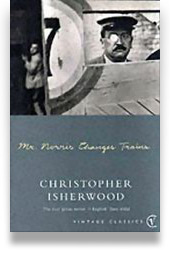Goodbye to Berlin ~ Christopher Isherwood
Four stories, surrounded by two pieces with diary entries, all told by someone we never really get to know:
I am a camera with its shutter open, quite passive, recording, not thinking. Recording the man shaving at the window opposite and the woman in the kimono washing her hair. Some day, all this will have to be developed, carefully printed, fixed.
Among the stories an introduction to the Sally Bowles of the Cabaret fame later. She is pictured as an idealized female stereotype, sleeping around with everyone except the narrator, but still a good girl.

I couldn’t help but notice how restrained this book must have become, for a reader a like me. Being used to a contemporary literature in which sex, or homosexuality for that matter, is openly discussed, I am sure to have missed many hints in this book.
Another problem is that I know Isherwood was gay, so the stories where the narrator interacts with his male friends seem to lack something. Or maybe it’s just me, wanting to read too much in them.
Still, I took this book up because Isherwood’s sparse writing style still gets praised so often. And especially the last diary entries, when the rise of the Nazi regime is eminent, turned out to be a sure proof of that.



 RSS feeds
RSS feeds